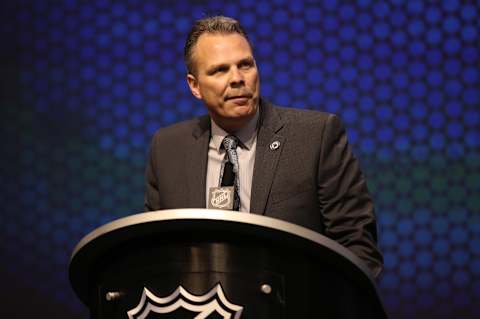Winnipeg Jets: Three Thoughts After Pierre-Luc Dubois Media Availability

Here are three thoughts from Pierre-Luc Dubois’ media appearance on July 25, 2022, discussing his decision to accept the Winnipeg Jets qualifying offer, and the rumors surrounding his future as a Jet.
On Monday Pierre-Luc Dubois met virtually with the media to discuss his decision to sign a one-year qualifying offer with the Winnipeg Jets, and more importantly to address the multitude of stories floating around the NHL that he and his agent have advised the team that he does not envision a future as a Winnipeg Jet.
Full credit to Dubois for even agreeing to face a savvy, informed local media group that he must have known would not shy away from asking direct, pointed questions. Dubois responded with some understandable frustration and vagueness but did clarify a few items for the media and fans.
Dubois directly addressed the reasons why he attended the NHL draft being that he was invited as a guest by his bank, and attended as a fan of hockey, not because he was expecting a trade to the Montreal Canadiens. He also downplayed his agent Pat Brisson’s media appearance where he stated that Dubois would like to play for his hometown Canadiens.
Dubois clarifies the "maybe one day" he would play for the Canadiens, aspect of his agent's comments were blown out of proportion.
— Carter Brooks (@CBrooksie84) July 25, 2022
Overall, Dubois’ message to fans and media was that at present he is unsure as to whether he wants to commit to the organization on a long-term basis, and is going to re-evaluate his choices when he becomes an unrestricted free agent, which is his right.
Here are three thoughts from the media appearance about the Dubois and the Winnipeg Jets moving forward.
3. The Disappointing Last Season Factored Into Dubois’ Decision
Pierre-Luc Dubois shared many of the standard off-season cliches players use after a failed season – that he’s working hard in the gym; looking forward to working with the new coaching staff; loves the guys in the dressing room. He also acknowledged that last season was disappointing as he felt that the team was better than the results they produced.
It’s no surprise then that a young, star player moving towards likely the most lucrative contract in his professional career, might be uncertain about committing long-term to a team in turmoil. If the Jets are truly a Stanley Cup contender at this time, I suspect his message may have been different.
The Jets chaotic last season included their long-tenured head coach quitting on the team before Christmas; reports of dysfunction in the dressing room from current and former players; a barely average level year for the team’s best player, Mark Scheifele, followed by a year-end nuclear media appearance where he essentially asked to be traded; and insider reports that loyal captain Blake Wheeler has asked for a trade.
New head coach Rick Bowness has a monumental task on his hands trying to steer the Jets back into the playoffs this season. That may not be enough to ensure Dubois re-signs with the club, but anything less is a guarantee he will be gone.

2. Player Empowerment Has Arrived in the NHL
Calgary Flames fans had a difficult summer watching superstar players exercise their choice to play in different markets. Unrestricted free agent Johnny Gaudreau chose less money to join the Columbus Blue Jackets essentially to be closer to his family in the United States.
Shortly following, restricted free agent Matthew Tkachuk advised the Flames that he would not be signing with the club long-term, prompting the team to trade him to the Florida Panthers. Despite receiving what most consider an excellent return, losing a young, unique talent like Tkatchuk stings.
In both cases, the players left the team after their first contract had expired following their entry-level deals. For Calgary fans, and NHL fans in general, this represented a shift. As an NBA fan, however, this kind of player empowerment and movement is common.
In the NBA star players regularly publicly express their desire to play in specific markets, and leverage the media and other players to do so. NBA agents also wield considerable influence and power amongst front offices and the media, and often leverage relationships with star players to influence free agent and trade decisions.
This type of player empowerment has officially arrived in the NHL. While it will be exceptionally difficult for small market and Canadian teams to navigate, I suspect that all NHL teams are going to see an increase in players and agents publicly stating where they would like to play, and influencing NHL teams decisions on extensions and trades.

1. Kevin Cheveldayoff Has to Adapt to This New Era
Kevin Cheveldayoff and the Winnipeg Jets ownership group’s general approach has been to draft well and develop that talent. The team has had many success stories with this approach producing players like Kyle Connor, Nikolaj Ehlers, Connor Hellebuyck, Mark Scheifele, and Josh Morrissey.
It is a sound approach for an NHL team, particularly in a small, less desirable market, where marquee free agents are unlikely to sign. It has allowed the Jets to capitalize on above average value for players still on their entry-level contracts. In addition, the Jets have been able to lock in a number of players that they drafted into a reasonable average annual value second contract, such as all of the players mentioned above.
With the increase in player empowerment in the NHL teams like the Jets are going to have a tougher time signing players to their second contract following their entry-level deal, and definitely, their third contract, as we are seeing with Pierre-Luc Dubois.
This does not mean that the draft and develop philosophy needs to be abandoned. However, it does mean that teams need to move the asset management approach to players, similar to that in the NBA. One of the characteristics of the Jets management and ownership group has been loyalty to players and coaches, perhaps at times to the detriment of the team.
To respond to these changing times, Kevin Cheveldayoff needs to be more proactive in terms of player asset management – signing players, trades, and free agency. I am not suggesting a complete roster turnover every year but taking a smart, ruthless, asset management approach, rather than one based on long-term loyalty to players.
Again, we can look to the NBA for an example. The Toronto Raptors took some massive risks in 2018 trading a franchise cornerstone player they drafted and developed (Demar Derozan) for one season of disgruntled, top three NBA player who they knew they would likely would never re-sign (Kawhi Leonard). In addition, they dumped a well respected, experienced but mediocre coach (Dwayne Casey) for an innovative, creative coach (Nick Nurse).
The result was an NBA championship for the Raptors in 2019. I am not suggesting that making similar moves in the NHL equates to a Stanley Cup. However, I do think that it is worth the risk, and the best approach to adapt to an era all teams, particularly those like the Jets are going to continue to be at risk of losing top talent.

Want your voice heard? Join the Jets White Out team!
Winnipeg Jets Fans: What do you think about Pierre-Luc Dubois’ future with the Winnipeg Jets? Leave your comments below!